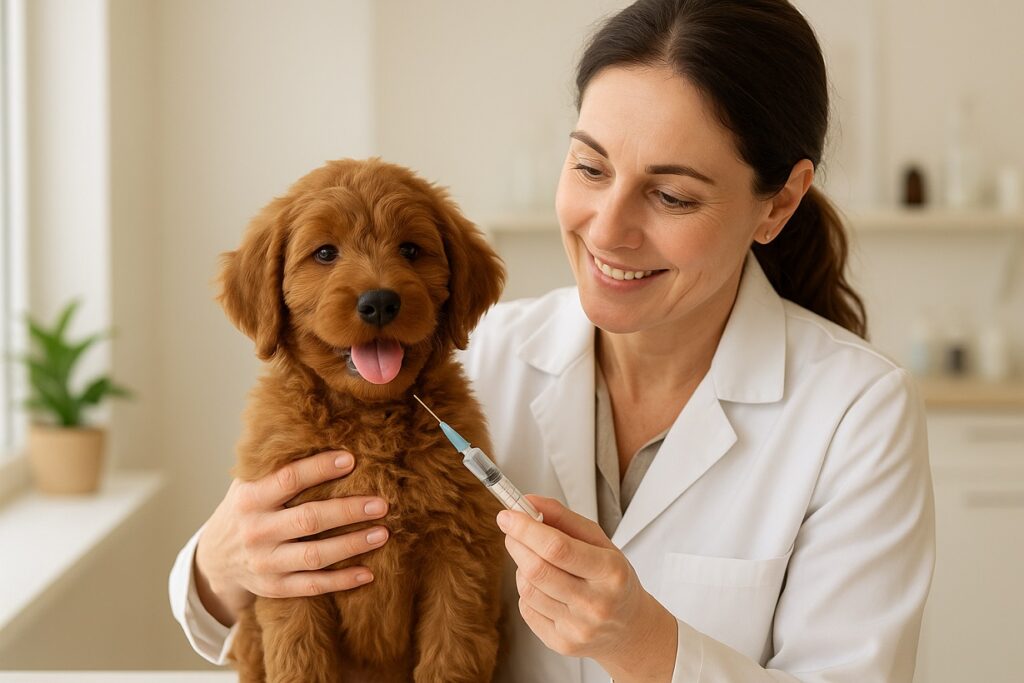Bringing home a new puppy is one of the most exciting and heartwarming moments in life. Along with cuddles, playtime, and teaching your pup where the potty spot is, there’s one responsibility that sometimes feels overwhelming for new puppy parents; vaccinations.
Vaccines are the foundation of your puppy’s long-term health. They protect against life-threatening diseases, some of which still claim the lives of unvaccinated dogs every year. But knowing when and what vaccines your puppy needs can feel like learning a whole new language.
As a responsible dog breeder, I often reassure new puppy owners that it’s not as complicated as it first appears. With a clear schedule and a good partnership with your vet, you’ll give your puppy the best possible start in life.
Why Vaccinations Matter
Puppies are born with some temporary protection from their mother’s antibodies, but this fades within the first few weeks of life. That’s where vaccinations step in. They “teach” your puppy’s immune system how to recognize and fight off diseases safely, without your pup ever having to get sick first.
Some of the illnesses we vaccinate against; like parvovirus and distemper; are highly contagious and often deadly. Others, like rabies, also protect human health and are legally required in many areas.
Vaccinations don’t just safeguard your puppy, they protect your family, other pets, and even the wider dog community.
Core vs. Non-Core Vaccines
Veterinarians typically divide vaccines into two categories:
Core Vaccines – Recommended for all puppies, regardless of where they live. These protect against the most dangerous and widespread diseases such as distemper, parvovirus, and rabies.
Non-Core Vaccines – Given based on your puppy’s lifestyle, environment, and risk factors. For example, a puppy that goes hiking in tick-heavy areas may need extra protection compared to a city pup.
The Standard Puppy Vaccination Schedule
Here’s a typical timeline most veterinarians follow. Keep in mind that your vet may adjust this based on your puppy’s health, breed, and local disease risks.
6–8 Weeks Old
DHPP (Distemper, Hepatitis/Adenovirus, Parvovirus, Parainfluenza) – This is often the first shot in the series.
Bordetella (Kennel Cough) – Sometimes given if your puppy will be around other dogs soon, such as at puppy socialization classes.
10–12 Weeks Old
DHPP Booster – Reinforces the first dose, ensuring the immune system builds strong protection.
Leptospirosis (optional, depending on region) – Protects against bacteria spread through water and wildlife urine.
14–16 Weeks Old
DHPP Booster – A critical third dose. Puppies who don’t complete this series often remain vulnerable.
Rabies Vaccine – Required by law in many states and essential for both pet and human health.
12–16 Weeks and Beyond
Optional Lifestyle Vaccines
Lyme Disease Vaccine – If ticks are a problem in your area.
Canine Influenza Vaccine – Recommended for dogs in boarding, daycare, or dog park environments.
Why Boosters Are So Important
One of the most common questions I hear is: “Why does my puppy need the same shot multiple times?”
Think of the immune system like a student. The first lesson introduces the material, but without repetition, the knowledge doesn’t stick. Each booster shot acts like a review session, helping your puppy’s body “memorize” how to fight off these diseases. Skipping boosters can leave gaps in protection, which is why finishing the series is critical.
After Puppyhood: Adult Dog Vaccines
Once your puppy completes the initial series, the work isn’t done forever. Dogs need booster vaccines every 1–3 years, depending on the specific vaccine and your veterinarian’s recommendations.
Your vet will guide you on:
- Which vaccines require annual boosters (like Bordetella).
- Which can be spaced out (like rabies or DHPP).
- Whether titers (blood tests that check immunity) are appropriate for your dog.
Common Side Effects (and When to Call Your Vet)
Most puppies handle vaccines with little more than a sore spot at the injection site or a bit of sleepiness. These mild reactions usually pass within a day.
However, call your vet right away if you notice:
- Persistent vomiting or diarrhea
- Facial swelling or hives
- Difficulty breathing
- Severe lethargy that doesn’t improve
True allergic reactions are rare, but quick medical attention makes all the difference.
Real-Life Tips for Puppy Parents
- Bring treats to the vet – Make vaccination visits a positive experience for your pup.
- Track everything – Keep a vaccination record; it will be needed for boarding, training classes, and even grooming appointments.
- Limit social exposure before shots are complete – Until your puppy finishes the series, avoid high-risk areas like dog parks where diseases can spread.
- Don’t delay – The timing of vaccines is just as important as the vaccine itself. Gaps in the schedule can leave puppies vulnerable.
What Happens If You Adopt an Older Puppy?
Sometimes families adopt puppies or young dogs with unknown vaccination histories. In these cases, most veterinarians will recommend starting the vaccine series over. It’s safer to restart than to risk incomplete protection.
Conclusion:
Vaccinating your puppy may feel like a big responsibility, but it’s one of the most important steps you can take for their lifelong health. With the right schedule, your puppy will be protected against diseases that once claimed countless young dogs.
Remember, your veterinarian is your partner in this journey. Don’t hesitate to ask questions, bring up concerns, or talk about your puppy’s unique lifestyle. Every puppy is different, but with a thoughtful vaccination plan, you’ll set your new best friend up for years of wagging tails, muddy paws, and happy adventures.
